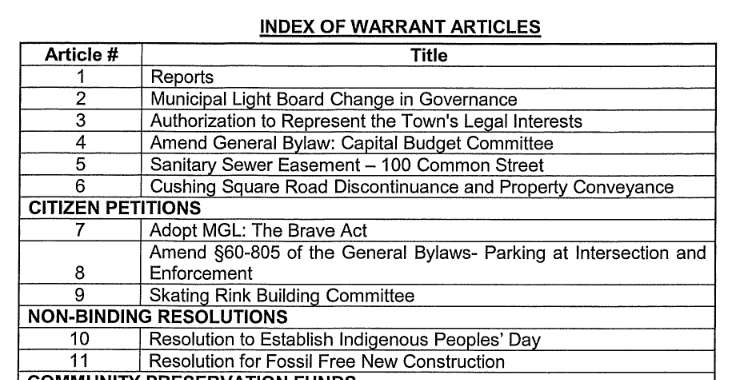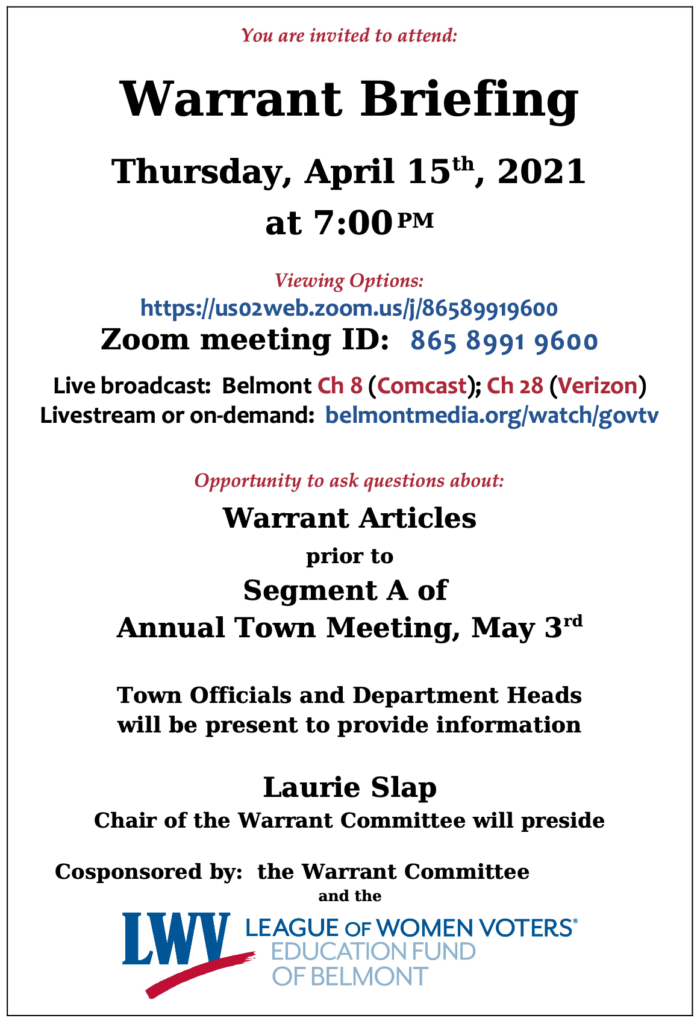Photo: The easement along the north side of the MBTA commuter rail tracks adjacent the French/Mahoney property off of Brighton Street.
An attempt by a prominent Belmont resident to kill off funding for a next step review of the proposed community path was beaten back by Belmont Town Meeting on Monday, June 7 showing the at times controversial project continues to hold wide support in town.
The amendment submitted by Frank French to return $200,000 to the Community Preservation Committee was defeated handily, 64-192, coming after a wild debate that saw French’s attorney make what appeared to be not so subtle threat the town is likely to face millions in legal judgments if it pursued the path project. That was followed by Belmont’s long-time state senator Will Brownsberger informing Town Meeting that it was French who wasn’t holding up his end of a decades-old bargain with the state that allowed his family to build on an old railroad right of way.
In fact, according to town officials, the engineering firm working on the path submitted a revised plan Monday morning that no longer required any forced taking which French was opposing, rendering his amendment – which took nearly two hours to debate – effectively moot.
Monday’s meeting – the second of four nights in which members would debate budget and financial issues – followed the script of the first in which a single binding article dominated the nearly four hour session as the meeting took up four projects presented by the Community Preservation Committee. Two projects, transferring $250,000 to the Belmont Housing Trust to initiate affordable housing partnerships and $35,000 in design costs as part of the renovation of Payson Park, breezed through with little trouble.
It didn’t come as a surprise the $200,000 sought by the Community Path Project Committee to determine the right of way for phase one of the path – from the Clark Street bridge to the Cambridge line at Brighton Street as well as a pedestrian tunnel under the MBTA commuter rail tracks at Alexander Ave – was set to begin a lively discourse as French filed his amendment to put the brakes on the project placing the path’s future on hold and effectively in doubt.
A great primer of the community path project can be found here.
Russ Leino, the chair of the Project Committee, told the assembled members (attending over Zoom or viewing on community television) the funds would be used by Nitsch Engineering to prepare a detailed Right of Way (ROW) plan as part of the requirements to obtain federal Transportation Improvement Program money that will pay for the majority of the construction.
The work will determine if any private property will be impacted by the construction, most likely that will be temporary and minor such as access to the property to complete the design work, said Leino, although there could be permanent impacts such as repairing retaining walls and at pinch points “but will not actually run over the property.” Owners can “donate” that access to the town or have an appraisal done to determine a fair dollar compensation which will require another Community Preservation Committee request to fund. ROW work isn’t new to Belmont as the town did a similar project when the state renovated Belmont Street and Trapelo Road and the recent completed Welling Safe Routes to School project. The plan is critical as the federal government and state will not move forward funding without it.
Saying his committee – as well as the town and Select Board – are committed to minimizing impacts to private property, Leino noted a project of this magnitude will effect someone’s lands. “The funding by this appropriation really has to be completed in order to fully understand and quantify … those impacts for the Town Meeting to decide what you want to do with that information,” said Leino.
French, Precinct 2, said he and the Mahoney family that jointly owns the land at the corner of the Brighton and the commuter rail tracks and from where they run their businesses, have granted an easement to the path but are opposed to any permanent takings. French mentioned the long-stand complaint by those opposing the path that it should have been placed on the south side of the commuter tracks (more on that to come). Because there was the likelihood of an eminent domain taking, the families have “consulted” attorney and Belmont resident George McLaughlin.
McLaughlin initially came before Town Meeting not forwarding his client’s claim but his own experience of 37 years of successfully litigating Eminent Domain lawsuits winning millions for his clients. When McLaughlin returned to the amendment at hand, he spoke at length that in his opinion, Belmont has “vastly underestimated” the potential damages from this path to residential property along Channing Road.
This line of argument apparently was far afield from a pre-meeting agreement with Town Moderator Micheal Widmer on what would be discussed. That consensus quickly blew up as Widmer and McLaughlin took issue with how much leeway would be given in arguing the amendment.
”Mr. McLaughlin, as we’ve discussed before this meeting. Eminent Domain is beyond the scope so I’ll repeat, you need to talk about the path,” said Widmer.
“What I’m trying to inform the Town Meeting members is that if they go ahead with this plan, I think they are pursuing a plan that explore exposes the town to, you know, $4 million in damages,” claimed McLaughlin.
While saying that McLaughlin’s general point on eminent domain was “fine” to bring up, Widmer requested the attorney to “please adhere to my request that you stay with the scope of the discussion,” noting he had done so three times. The back and forth continued with both men saying they had grown frustrated with each others stance with McLaughlin claiming Widmer had “changed the rules” of the debate.
As Widmer attempted to wrangle McLaughlin in – with little success – Town Meeting members began bombarding Town Clerk Ellen Cushman with Point of Order claims noting McLaughlin was well outside the scope of the matter at hand. Widmer pointed out that a town meeting could not be run by those citing rules violations.
While French and McLaughlin spoke on the town taking a portion of the property, Leino presented an “11th hour” development in which Nitsch determined on the previous Friday that the latest design no longer required taking a permanent easement of the French/Mahoney property. “It can be done there on the existing easement. I was happy to see that as a positive development,” said Leino.
And Brownsberger turned French’s claims on their head by reviewing the context of how French’s secured the site in the first place. Brownsberger said in 2008, French – who Brownsberger called a friend who he respects – approached Brownsberger seeking his support in building his business office on the site knowing the right of way would bisect the property. French building sits on a historic railroad right of way, used as far back as the 1870s as the Fitchburg to Lowell connection until passenger service ended in 1927 and commercial rail halted in the 1980s. State statutes requires anyone attempting to build on a rail road right of way to first obtain a determination of inapplicability from the Department of Transportation.
In 2009, Brownsberger helped French get the process rolling to build but only if the Mass DOT which regulates rail right of ways would preserve the possibility of building a bike path from Brighton Street to Belmont Center and not give away the entire right of way which it did.
“So the point is that MASS DOT gave the ability for Mr. French to build … but retains the right to build a bike path through it,” said Brownsberger. While he was allowed to build up to the easement, French also crossed into it to install a stone sign, curbing and parking with the hope that a possible bike path would never be built.
“Now I was chagrined when I learned that Mr. French was upset about this process,” said Brownsberger. While acknowledging that previous design plans from Nitsch appeared to violate the decades old compromise between the state and French, Brownsberger “is very relieved that the discussion over the past week … that there is no need” for any additional land taking in the latest engineering blueprints.
With French’s concerns apparently addressed, “I look forward to continuing to support this path,” working with the state so to “keep solving problems and keep moving this fast forward,” said Brownsberger. “As an elected official, I am absolutely committed to making sure this works within the easement.”
Select Board Member Mark Paolillo next spoke in greater detail how town officials and representatives from Nitsch would keep the path within its prescribed easement. He also addressed the need for the route to travel along the northside of the commuter tracks as being due to the reluctance of the owner of an essential rail spur to negotiate with the town.
With debate open to the public, members sentiments ranged the gambit of why the French amendment was allowed to move forward if the “problem had been solved” to Stephen Rosales from Precinct 8 expressing his support for French via the lyrical talents of Kenny Rogers.
”You got to know when to hold them, know when to fold them, know when to walk away and know when to run,” Rosales said, not sung. Despite the Yeoman efforts by the town, “the time has come. Belmont can no longer hold them,” he said noting that the CPC will “ante up” $1.7 million in studies and engineering work without any guarantee of federal or state funding.
Mark Kagan, Precinct 8, said roadblocks such as the French amendment is the reason that popular infrastructure projects are delayed or killed off. Having lived in bike happy the Netherlands, Kagan said cycling is the wave of the future as it promotes safe, fast transportation that is climate friendly. “Let’s vote this down this amendment and move on Belmont, the greater Boston area and the United States into the future,” said Kagan.
The question was called and the subsequent vote on the Amendment was an overwhelming defeat for French. The debate on the $200,000 allocation for ROW costs was anticlimactic and speedy with the article passing, 200 to 50.
Tennis plus one at Winn Brook
Town Meeting voted to add a single tennis court to the existing facility adjacent to the Winn Brook Elementary School playground and the Joey’s Park Playground.
Jon Marshall, the assistant town manager and recreation director, said an additional court was suited to the site because 1. the town can always use more courts, and 2. an additional tennis court will make for a total of five which is needed to hold regular season and tournament contests by the Belmont High School tennis teams.
Opposition to the new court came from two camps: nearby residents and those who wish to see courts on the high school campus. Melissa McIntyre, Precinct 8, opposed the article, not so much the courts being placed in the neighborhood but the public process the Recreation Commission undertook in approving the location. McIntyre said the strip of green space between Joey’s Park and the courts which will be reduced is an important place that is a place to take a break from the hurly burly of the playground and sport fields. Kathleen “Fitze” Cowing, also Precinct 8, asking why unlike other park and recreation projects the tennis court didn’t go through a two-fpart approval process with a design phase followed by CPC construction funding.
But by 10:45 p.m., the meeting had little energy to go against the CPC’s recommendation and there will be a fifth court at the Winn Brook by the start of the varsity tennis season next April.

